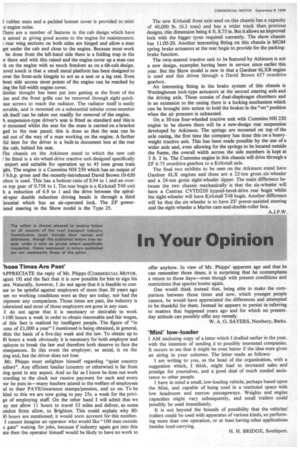'hose Times Are Past' APPRECIATE the reply of Mr. Phipps
Page 62

If you've noticed an error in this article please click here to report it so we can fix it.
(COMMERCIAL MOTOR, igust 19) and the fact that it is now possible for him to sign his .me. Naturally, however, I do not agree that it is feasible to conme to be spiteful against employers of more than 30 years ago ten no working conditions were as they are today, nor had the uipment any comparison. Those times are past, the industry is odernized and most of those employers are gone in any case.
I do not agree that it is necessary or desirable to work )-100 hours a week in order to obtain reasonable and fair wages, id this fact is realized by intelligent people. The figure of "in cess of £1,000 a year" I mentioned is being obtained, in general, [thin the basis of a five-day week and the law. To obtain up to )0 hours a week obviously it is necessary for both employer and iployee to break the law and therefore both deserve to face the .nsequences. In this event the employer, as usual, is on the sing end, but the driver does not lose.
Mr. Phipps must enlighten himself regarding "quiet country iuliers". Any efficient haulier (country or otherwise) is far from :ing quiet in any aspect. And so far as I know he does not work :cording to the clock nor receive payment for each and every )ur he puts in—many hauliers attend to the welfare of employees id to their PAYE/insurance stamps/pension, and so on. To be lded to this we are now going to pay 25s. a week for the privige of employing staff. On the other hand I will admit that we ay not allow 11 hours to travel 53 miles and deliver, as some ondon firms allow, to Brighton. This could explain why 80)0 hours are mentioned: it would soon account for this numbcr. I cannot imagine an operator who would like "100 men outside s gate" waiting for jobs, because if industry again got into this ate then the operator himself would be likely to have no work to offer anyhow. In view of Mr. Phipps' apparent age and that he can remember those times, it is surprising that he contemplates a return to those days—even though with present conditions and restrictions that spectre looms again.
One would think instead that, being able to make the comparison between those times and now, which younger people cannot, he would have appreciated the differences and attempted to be thankful for them. Instead he appears to persist in referring to matters that happened years ago and for which no presentday attitude can possibly offer any remedy.
W. A. G. SAYERS, Newbury, Berks.
'Mini' low-loader I AM enclosing copy of a letter which I drafted earlier in the year, with the intention of sending it to possibly interested companies. It occurs to me that it might be even better if the idea were given an airing in your columns. The letter reads as follows: I am writing to you, as the head of the organization, with a suggestion which, I think, might lead to increased sales and prestige for yourselves, and a good deal of much needed assistance to other people.
I have in mind a small, low-loading vehicle, perhaps based upon the Mini, and capable of being used in a restricted space with low headroom and narrow passageways. Weights and engine capacities might vary subsequently, and small trailers could possibly be used immediately.
It is not beyond the bounds of possibility that the vehicles/ trailers could be used with apparatus of various kinds, so performing more than one operation. or at least having other applications besides load-carrying.
H. H. BRIDGE. Southport.
































































































































